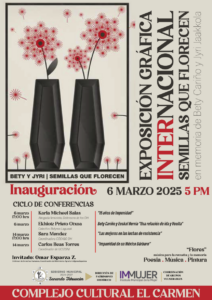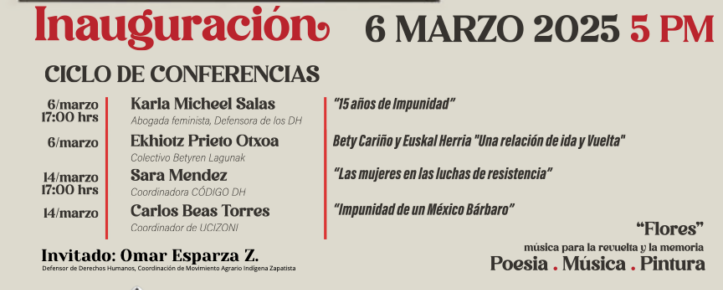Within the context of International Women’s Day and after it toured several European countries, the exhibition “Seeds that Bloom” was inaugurated in Tehuacán, Puebla at the El Carmen Cultural Complex. The project aims to honor the memory of two defenders of human rights murdered in the humanitarian caravan traveling to San Juan Copala in 2010.
On April 27, 2010, Alberta “Bety” Cariño Trujillo, a distinguished defender of human rights in Mexico, and Jyri Jaakkola, a Finnish activist, were murdered in an ambush by a paramilitary group. Both formed part of a humanitarian caravan that was heading to the Triqui community of San Juan Copala, Oaxaca, to offer support and document conditions of isolation and violence that the inhabitants were suffering.
Despite the seriousness of the crime and the outrage it generated nationally and internationally, the perpetrators remain unpunished. The families of Bety and Jyri have denounced the protection that the authorities have given to those responsible and the lack of progress in the investigation. They took the case to the Inter-American Commission on Human Rights (IACHR) in search of justice.
In this context, the traveling exhibition, “Seeds that Bloom,” was born, serving as an homage to the memory and legacy of Bety Cariño and Juri Jaakola. Through different artistic expressions, the exhibition seeks to make visible their struggle and keep the demand for justice alive. Additionally, it aims to raise awareness about the importance of the defense of human rights and the construction of peace.
Timeline and Countries Visited
• Oaxaca, Mexico (October 30-November 3, 2023): The exhibition was presented in the Institute of Graphic Art in Oaxaca, with the participation of family, friends, and nonprofit organizations that have been demanding justice for 13 years for the murders of Bety and Jyri.
• Strasbourg, France (December 11-15, 2023): The show was exhibited in the European Parliament, emphasizing the importance of collective memory and the fight for more just and equal societies.
• Helsinki, Finland (May 27-28, 2024): During the World Village Festival, the exhibit was visited by approximately 45,000 people. Eve Jaakkola, Jyri’s mother, emphasized the importance, solidarity, and compassion of the attendees, who asked about the status of the case.
• Turku and Tampere, Finland (April 2024): The exhibit continued its journey in Finland, displayed in a social forum in these cities.
• Basque Country and France (April 2024): Memorial activities and exhibitions were held in various regions, strengthening the network of international support.
• Helsinki, Finland (May 24-25, 2024): The display returned to the Finnish capital as part of the World Village Festival, reinforcing international solidarity and the demand for justice.
• Switzerland and Germany (June 2024): The exhibition was presented in various cities, amplifying its outreach and spreading awareness about Bety and Jyri’s work to more people.
• Return to Mexico (March 6, 2025): The exhibit will be shown until the first week of April in the El Carmen Cultural Complex in Tehuacán. After its tour in Europe, it will continue its work of consciousness-raising and tribute.
Reflections and voices at the inauguration
At the inauguration, Adriana Estrada Trejo, the director of Historical Heritage, highlighted the importance of Tehuacán receiving this international work that contributes to raising awareness about human rights and their defense. Likewise, the coordination of Vulnerable Groups Vania Gallegos and Norma Castillo, from the Women’s Section in Tehuacán, underlined the fundamental role of women in the defense of indigenous people’s rights, in addition to the struggle against gender-based violence that continues to affect many.
Omar Esparza offered a review of Bety Cariño’s life and struggle in Tehuacán. He recalled her work in the popular colonies on the outskirts, her literacy work with women in Lázaro Cárdenes, Maravillas, and 21 de Marzo in 1995, as well as her participation in the indigenous fight with el Consejo de la Sierra Negra Chicahu-Tepetihui. He expressed the relevance of this work 15 years after her murder and the impunity that still exists.
From the Betyren Lagunak collective in the Basque Country, Ekhiotz Prieto recalled his meeting with Bety in 2009 through the platform of Human Rights in Dublin. He emphasized the profound connection between original communities from Mexico and from the Basque Country, pointing out similarities in language, dance, normative systems, and in the fight for autodetermination in the face of colonialism and imperialism. “Bety shared with us the thousand-year old memory of original communities from Mexico, an inheritance that is still alive in the struggle,” he stated.
David Peña, a lawyer and a member of the Action Group for Human Rights and Social Justice, talked about the long journey of this case and the system of impunity that protects the murderers. He explained that, despite efforts to achieve justice, the political actors in power have perpetrated violence in the Triqui region. He underlined that the Inter-American Commission on Human Rights represents a key route to justice and reaffirmed that Bety continues to flourish in the collective memory. “We will never tire of seeking justice. Because of this, ‘Seeds that Bloom’ is another form of fighting back, an act of resistance to remember the memory of who fought and who continues to fight,” he asserted.
The poets Grissel Gómez and Alma Vanegas, whose texts were selected for this exhibition, offered a reading of their poems in memory of Bety Cariño.
The event closed with protest music, a space that allowed the attendees to enjoy and reflect on this international work.
Memory and resistance
“Seeds that Bloom” is not just an act of resistance and memory. It is a scream for justice. It reminds us of the importance of honoring those who have given their lives in the defense of human rights and the necessity of continuing to fight against impunity.


